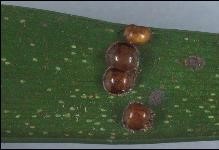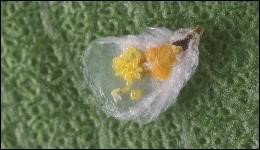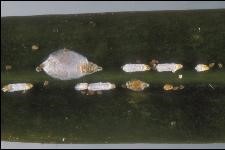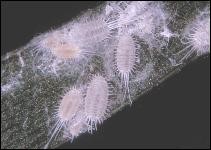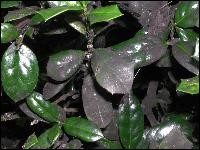Scale insects are one of the most serious problems homeowners face on ornamentals this time of year. The most common are armored scale, soft scale, and mealybugs. They cause damage by sucking plant fluids from the leaves, stems, and sometimes roots. Some species feed on the underside of the leaves which can appear as yellowing spots or chlorotic lesions. Heavy infestations can cause extensive leaf yellowing, premature leaf drop, branch dieback, and plant death.
The life cycle starts when the eggs are laid beneath a waxy covering or beneath the adult female. After the eggs hatch two to three weeks later, the nymphs (crawlers) move around the plant until they find a suitable feeding site. Crawlers then insert their straw-like mouthparts into the plant and begin to feed and grow. The male often develops wings and flies to locate a mate.
Armored scale is distinct from other types of scales because they secrete a waxy covering over their body that is not attached to the body. The scale lives and feeds under this covering ranging 1/16 to 1/8 inch in size. They can be any color or shape, depending on the species. Armored scale does not produce honeydew.
Soft scale also secretes a waxy covering but it is attached to the bodies. Soft scales vary in color, size, and shape. They are circular shaped and range from 1/8 to ½ inch in diameter. Because they consume so much plant sap, they excrete a lot of sugary liquid called honeydew. Honeydew is the sticky liquid found on the leaves.
Mealybugs are soft bodied insects that are often covered with cottony white filaments. They are 1/8 inch in size and feed on all parts of plants. Injured plants have discolored, wilted, and deformed foliage.
Sooty mold is caused when mealybugs and soft scales excrete large amounts of honeydew which provides an excellent medium for the growth of the black fungus. Sooty mold is not only unattractive; it slows down the growth of the plant as it interferes with photosynthesis. Over time, with the control of the insect population, the sooty mold will weather away. Ants can also play a big factor in controlling sooty mold as they will feed on the honeydew.
To control scale and mealybugs, avoid over-fertilizing and monitor your plants often. If the infestation becomes over-bearing, spray a fine mist of Horticultural Oil on the foliage. Avoid spraying in the summer heat because of damaging foliage. Other chemicals that can be used if necessary are Sevin dust and Malathion.
- Vegetable Garden Insect and Disease Management - June 10, 2015
- Insect Problems in the Heat of Summer - May 8, 2015
- Gardening in a Bucket - April 14, 2015

